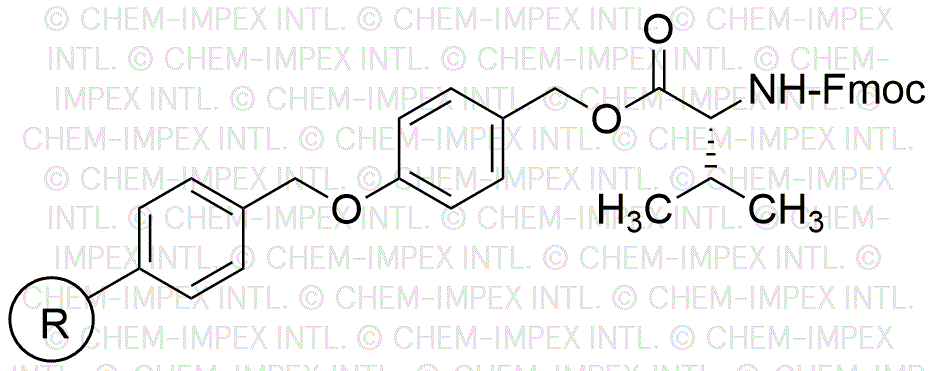Fmoc-D-valine 4-alkoxybenzyl alcohol resin is widely utilized in research focused on:
- Peptide Synthesis: This resin serves as a solid support for the synthesis of peptides, allowing for efficient coupling of amino acids and facilitating the production of complex peptide sequences.
- Drug Development: In pharmaceutical research, it is used to create peptide-based drugs, which can lead to more targeted therapies with fewer side effects compared to traditional small-molecule drugs.
- Bioconjugation: The resin can be employed in bioconjugation processes, where peptides are linked to other biomolecules, enhancing the specificity and efficacy of drug delivery systems.
- Research in Cancer Therapeutics: It is particularly valuable in developing peptide-based agents for cancer treatment, offering a pathway to innovative therapies that can selectively target cancer cells.
- Custom Peptide Libraries: Researchers utilize this resin to create diverse peptide libraries for screening potential drug candidates, accelerating the discovery of new therapeutic agents.
General Information
Properties
Safety and Regulations
Applications
Fmoc-D-valine 4-alkoxybenzyl alcohol resin is widely utilized in research focused on:
- Peptide Synthesis: This resin serves as a solid support for the synthesis of peptides, allowing for efficient coupling of amino acids and facilitating the production of complex peptide sequences.
- Drug Development: In pharmaceutical research, it is used to create peptide-based drugs, which can lead to more targeted therapies with fewer side effects compared to traditional small-molecule drugs.
- Bioconjugation: The resin can be employed in bioconjugation processes, where peptides are linked to other biomolecules, enhancing the specificity and efficacy of drug delivery systems.
- Research in Cancer Therapeutics: It is particularly valuable in developing peptide-based agents for cancer treatment, offering a pathway to innovative therapies that can selectively target cancer cells.
- Custom Peptide Libraries: Researchers utilize this resin to create diverse peptide libraries for screening potential drug candidates, accelerating the discovery of new therapeutic agents.
Documents
Safety Data Sheets (SDS)
The SDS provides comprehensive safety information on handling, storage, and disposal of the product.
Product Specification (PS)
The PS provides a comprehensive breakdown of the product’s properties, including chemical composition, physical state, purity, and storage requirements. It also details acceptable quality ranges and the product's intended applications.
Certificates of Analysis (COA)
Search for Certificates of Analysis (COA) by entering the products Lot Number. Lot and Batch Numbers can be found on a product’s label following the words ‘Lot’ or ‘Batch’.
Número de catálogo
Número de lote/lote
Certificates Of Origin (COO)
This COO confirms the country where the product was manufactured, and also details the materials and components used in it and whether it is derived from natural, synthetic, or other specific sources. This certificate may be required for customs, trade, and regulatory compliance.
Número de catálogo
Número de lote/lote
Safety Data Sheets (SDS)
The SDS provides comprehensive safety information on handling, storage, and disposal of the product.
DownloadProduct Specification (PS)
The PS provides a comprehensive breakdown of the product’s properties, including chemical composition, physical state, purity, and storage requirements. It also details acceptable quality ranges and the product's intended applications.
DownloadCertificates of Analysis (COA)
Search for Certificates of Analysis (COA) by entering the products Lot Number. Lot and Batch Numbers can be found on a product’s label following the words ‘Lot’ or ‘Batch’.
Número de catálogo
Número de lote/lote
Certificates Of Origin (COO)
This COO confirms the country where the product was manufactured, and also details the materials and components used in it and whether it is derived from natural, synthetic, or other specific sources. This certificate may be required for customs, trade, and regulatory compliance.

